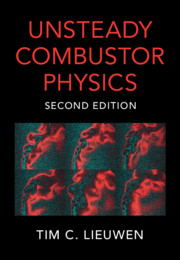Book contents
- Unsteady Combustor Physics
- Unsteady Combustor Physics
- Copyright page
- Summary Contents
- Detailed Contents
- Acknowledgments
- Introduction
- Overview of the Book
- 1 Basic Equations
- 2 Decomposition and Evolution of Disturbances
- 3 Hydrodynamic Flow Stability I: Linear Instability
- 4 Hydrodynamic Flow Stability II: Common Combustor Flow Fields
- 5 Acoustic Wave Propagation I: Basic Concepts
- 6 Acoustic Wave Propagation II: Heat Release, Complex Geometry, and Mean Flow Effects
- 7 Flame Sheet and Flow Interactions
- 8 Ignition
- 9 Internal Flame Processes
- 10 Flame Stabilization, Flashback, Flameholding, and Blowoff
- 11 Forced Response I: Flamelet Dynamics
- 12 Forced Response II: Heat Release Dynamics
- Index
- References
5 - Acoustic Wave Propagation I: Basic Concepts
Published online by Cambridge University Press: 27 October 2021
- Unsteady Combustor Physics
- Unsteady Combustor Physics
- Copyright page
- Summary Contents
- Detailed Contents
- Acknowledgments
- Introduction
- Overview of the Book
- 1 Basic Equations
- 2 Decomposition and Evolution of Disturbances
- 3 Hydrodynamic Flow Stability I: Linear Instability
- 4 Hydrodynamic Flow Stability II: Common Combustor Flow Fields
- 5 Acoustic Wave Propagation I: Basic Concepts
- 6 Acoustic Wave Propagation II: Heat Release, Complex Geometry, and Mean Flow Effects
- 7 Flame Sheet and Flow Interactions
- 8 Ignition
- 9 Internal Flame Processes
- 10 Flame Stabilization, Flashback, Flameholding, and Blowoff
- 11 Forced Response I: Flamelet Dynamics
- 12 Forced Response II: Heat Release Dynamics
- Index
- References
Summary
This chapter discusses acoustic wave propagation in combustor environments. As noted in Chapter 2, acoustic waves propagate energy and information through the medium without requiring bulk advection of the flow. For this reason, and as discussed further in this chapter, the details of the time-averaged flow have relatively minor influences on the acoustic wave field in low Mach number flows. In contrast, vortical disturbances, which propagate with the local flow field, are highly sensitive to the flow details. For these reasons, there is no analogue in the acoustic problem to the myriad different ways in which vorticity can organize and reorganize itself as in the hydrodynamic stability problem. Rather, in low Mach number flows the acoustic field is insensitive to these details and is largely controlled by the boundaries and sound speed field.
- Type
- Chapter
- Information
- Unsteady Combustor Physics , pp. 176 - 209Publisher: Cambridge University PressPrint publication year: 2021
References
- 1
- Cited by

